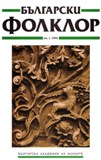Немската градска песен и влиянието й върху българската
The German Urban Song and Its Influence on the Bulgarian One
Author(s): Nikolay KaufmanSubject(s): Anthropology
Published by: Институт за етнология и фолклористика с Етнографски музей при БАН
Summary/Abstract: Bulgarian urban songs originated at the beginning of the 1940s. The first representatives of this genre were Dobri Chintulov’s revolutionary songs and Petko Slaveykov’s love songs. Their tunes and texts were influenced by the Russian revolutionary song (Chintulov) and the Turkish or Greek love song (Slaveykov). After the Liberation many young Bulgarians began to study in European countries, mainly Austria, Germany and France. Coming back to their homeland, they transmitted German and other European tunes and songs, translating the texts in Bulgarian. Most often these young people became school teachers. Thus a number of German children’s songs came to be popular in Bulgarian schools and the children accepted them with pleasure as their own “Bulgarian” ones. Some of these songs are still performed nowadays. Most of the first Socialist songs, which appeared in Bulgaria at the end of the 19th century, were actually German tunes provided with free Bulgarian translation of the texts. Such is also the case of some tourist songs, whose melodies were borrowed from German and Austrian originals. The German popular tunes have a strong impact on the Bulgarian songs of this genre, which originated in the middle of the 1920s. The first records of Bulgarian popular tunes are made in Germany. The famous singer Asparuh Leshnikov, who used to be the main figure in the world-famous band “Comedian harmonics” disbanded during Hitler’s regime, came back to Bulgaria from Germany. The German popular song of that time had a significant influence on the formation of this genre in Bulgaria.
Journal: Български фолклор
- Issue Year: XXXII/2006
- Issue No: 1
- Page Range: 78-96
- Page Count: 19
- Language: Bulgarian
- Content File-PDF

